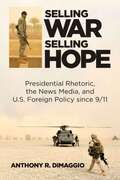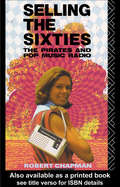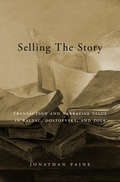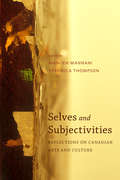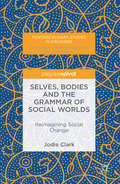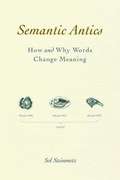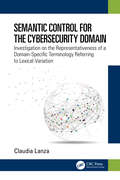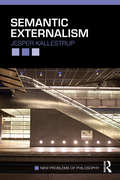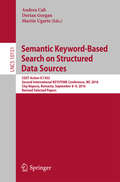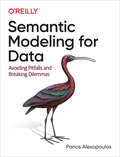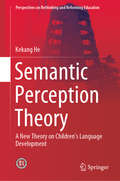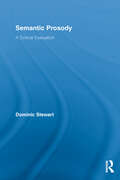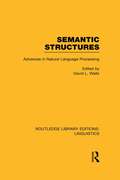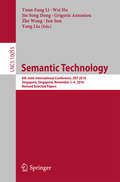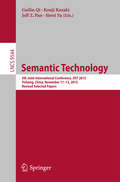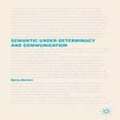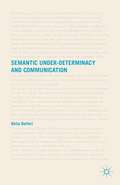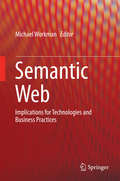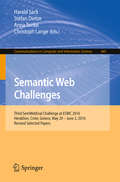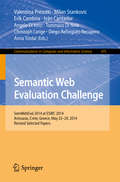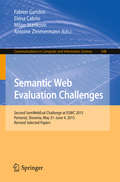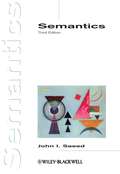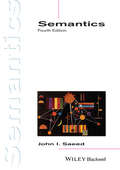- Table View
- List View
Selling Shakespeare
by Adam G. HooksSelling Shakespeare tells a story of Shakespeare's life and career in print, a story centered on the people who created, bought, and sold books in the early modern period. The interests and investments of publishers and booksellers have defined our ideas of what is 'Shakespearean', and attending to their interests demonstrates how one version of Shakespearean authorship surpassed the rest. In this book, Adam G. Hooks identifies and examines four pivotal episodes in Shakespeare's life in print: the debut of his narrative poems, the appearance of a series of best-selling plays, the publication of collected editions of his works, and the cataloguing of those works. Hooks also offers a new kind of biographical investigation and historicist criticism, one based not on external life documents, nor on the texts of Shakespeare's works, but on the books that were printed, published, sold, circulated, collected, and catalogued under his name.
Selling War, Selling Hope: Presidential Rhetoric, The News Media, And U. S. Foreign Policy Since 9/11
by Anthony R. DiMaggioDetails how presidents utilize mass media to justify foreign policy objectives in the aftermath of 9/11.
Selling the Sixties: The Pirates and Pop Music Radio
by Robert ChapmanWas it a non-stop psychedelic party or was there more to pirate radio in the sixties than hedonism and hip radicalism? From Kenny Everett's sacking to John Peel's legendary `Perfumed Garden' show, to the influence of the multi-national ad agencies, and the eventual assimilationof aspects of unofficial pop radio into Radio One, Selling the Sixties examines the boom of private broadcasting in Britain. Using two contrasting models of pop piracy, Radios Caroline and London, Robert Chapman sets pirate radio in its social and cultural context. In doing so he challenges the myths surrounding its maverick `Kings Road' image, separating populist consumerism from the economic and political machinations which were the flipside of the pirate phenomenon. Selling the Sixties includes previously unseen evidence from the pirates' archives, revealing interviews and an unrivalled selection of rare audio materials.
Selling the Story: Transaction and Narrative Value in Balzac, Dostoevsky, and Zola
by Jonathan PaineEvery writer is a player in the marketplace for literature. Jonathan Paine locates the economics ingrained within the stories themselves, showing how the business of literature affects even storytelling devices such as genre, plot, and repetition. In this new model of criticism, the text is a record of its author’s sales pitch.
Selves and Subjectivities: Reflections on Canadian Arts and Culture
by Manijeh Mannani Veronica ThompsonLong a topic of intricate political and social debate, Canadian identity has come to be understood as fragmented, amorphous, and unstable, a multifaceted and contested space only tenuously linked to traditional concepts of the nation. As Canadians, we are endlessly defining ourselves, seeking to locate our sense of self in relation to some Other. By examining how writers and performers have conceptualized and negotiated issues of personal identity in their work, the essays collected in Selves and Subjectivities investigate emerging representations of self and other in contemporary Canadian arts and culture. Included are essays on iconic poet and musician Leonard Cohen, Governor General award–winning playwright Colleen Wagner, feminist poet and novelist Daphne Marlatt, film director David Cronenberg, poet and writer Hédi Bouraoui, author and media scholar Marusya Bociurkiw, puppeteer Ronnie Burkett, and the Aboriginal rap group War Party. As critic Diana Brydon has argued, contemporary Canadian writers are "not transcending nation but resituating it." Drawing together themes of gender and sexuality, trauma and displacement, performativity, and linguistic diversity, Selves and Subjectivities offers an exciting new contribution to the multivocal dialogue surrounding the Canadian sense of identity.
Selves, Bodies and the Grammar of Social Worlds
by Jodie ClarkThis book is an invitation to researchers who are committed to social change to look for ideas about transformation in an unexpected place - that is, in the data generated from empirical research. Informed by Critical Discourse Analysis and postmodern theory, it proposes a method of locating, through close grammatical analysis of everyday descriptions of the social world, the desire for alternative transformative structures. Drawing upon insightful analysis of conversational data collected over a period of 12 years from both 'marginalised' and 'mainstream' participants, it reveals innovative ways of imagining social structure. Clark proposes a view of the social world as in an embodied relationship with embodied selves.
Semantic Antics: How and Why Words Change Meaning
by Sol SteinmetzAfter an introduction surveying the many reasons that words might change meaning over the years and centuries, lexicographer Steinmetz cites in dictionary fashion English words that used to mean something different than they do now. Entries are about a half page long. A glossary of names and terms is provided. Pronunciations are not indicated for anything. Annotation ©2008 Book News, Inc. , Portland, OR (booknews. com)
Semantic Control for the Cybersecurity Domain: Investigation on the Representativeness of a Domain-Specific Terminology Referring to Lexical Variation
by Claudia LanzaThis book presents the creation of a bilingual thesaurus (Italian and English), and its conversion into an ontology system, oriented to the Cybersecurity field of knowledge term management and the identification of a replicable method over other specialized areas of study, through computational linguistics procedures, to a statistical and qualitative measurement of the terminological coverage threshold a controlled vocabulary is able to guarantee with respect to the semantic richness proper to the domain under investigation. The volume empowers readers to compile and study significant corpora documentations to support the text mining tasks and to establish a representativeness evaluation of the information retrieved. Through a description of several techniques belonging to the field of linguistics and knowledge engineering, this monograph provides a methodological account on how to enhance and update semantic monitoring tools reflecting a specialized lexicon as that of Cybersecurity to grant a reference semantic structure for domain-sector text classification tasks. This volume is a valuable reference to scholars of corpus-based studies, terminology, ICT, documentation and librarianship studies, text processing research, and distributional semantics area of interest as well as for professionals involved in Cybersecurity organizations.
Semantic Externalism (New Problems of Philosophy)
by Jesper KallestrupSemantic externalism is the view that the meanings of referring terms, and the contents of beliefs that are expressed by those terms, are not fully determined by factors internal to the speaker but are instead bound up with the environment. The debate about semantic externalism is one of the most important but difficult topics in philosophy of mind and language, and has consequences for our understanding of the role of social institutions and the physical environment in constituting language and the mind. In this long-needed book, Jesper Kallestrup provides an invaluable map of the problem. Beginning with a thorough introduction to the theories of descriptivism and referentialism and the work of Frege and Kripke, Kallestrup moves on to analyse Putnam’s Twin Earth argument, Burge’s arthritis argument and Davidson’s Swampman argument. He also discusses how semantic externalism is at the heart of important topics such as indexical thoughts, epistemological skepticism, self-knowledge, and mental causation. Including chapter summaries, a glossary of terms, and an annotated guide to further reading, Semantic Externalism an ideal guide for students studying philosophy of language and philosophy of mind.
Semantic Keyword-Based Search on Structured Data Sources
by Andrea Calì Dorian Gorgan Martín UgarteThis book constitutes the thoroughly refereed post-conference proceedings of the Second COST Action IC1302 International KEYSTONE Conference on Semantic Keyword-Based Search on Structured Data Sources, IKC 2016, held in Cluj-Napoca, Romania, in September 2016. The 15 revised full papers and 2 invited papers are reviewed and selected from 18 initial submissions and cover the areas of keyword extraction, natural language searches, graph databases, information retrieval techniques for keyword search and document retrieval.
Semantic Modeling for Data: Avoiding Pitfalls And Breaking Dilemmas
by Panos AlexopoulosWhat value does semantic data modeling offer? As an information architect or data science professional, let’s say you have an abundance of the right data and the technology to extract business gold—but you still fail. The reason? Bad data semantics.In this practical and comprehensive field guide, author Panos Alexopoulos takes you on an eye-opening journey through semantic data modeling as applied in the real world. You’ll learn how to master this craft to increase the usability and value of your data and applications. You’ll also explore the pitfalls to avoid and dilemmas to overcome for building high-quality and valuable semantic representations of data.Understand the fundamental concepts, phenomena, and processes related to semantic data modelingExamine the quirks and challenges of semantic data modeling and learn how to effectively leverage the available frameworks and toolsAvoid mistakes and bad practices that can undermine your efforts to create good data modelsLearn about model development dilemmas, including representation, expressiveness and content, development, and governanceOrganize and execute semantic data initiatives in your organization, tackling technical, strategic, and organizational challenges
Semantic Perception Theory: A New Theory on Children's Language Development (Perspectives on Rethinking and Reforming Education)
by Kekang HeBased on an in-depth study of children’s language development theory, this book puts forward the original proposition that semantic perception is the human sixth sense. Presenting a detailed, complete, and scientific argumentation, it asserts that the innateness of semantic perception has a physiological basis and that language acquisition is based on semantic perception, and proposes the idea of a critical period of nurture and language growth. To this end, the book not only contrasts children’s language acquisition processes and the process of adult speech generation and comprehension, but also discusses the ability to read and write, describing this important stage of children’s language development and analyzing semantic perception. Focusing on education and psychology, it also discusses the use of semantic perception theory to instruct teaching and learning. This book is a valuable resource for teachers, researchers, practitioners and graduate students in the fields of educational technology, child development and language learning, as well as anyone interested in children’s language development.
Semantic Prosody: A Critical Evaluation (Routledge Advances in Corpus Linguistics)
by Dominic StewartSemantic Prosody is the first full-length treatment of semantic prosody, a concept akin to connotation but which connects crucially with typical lexical environment. For example, it has been claimed that the adverb 'utterly' is characterised by an unfavourable semantic prosody on account of its habitual co-occurrence with words denoting unfavourable states of affairs such as 'ridiculous', 'disgraceful' and 'miserable'. Primarily for this reason, semantic prosody has emerged almost exclusively within the field of corpus linguistics. However, the overall picture is complex, and this book offers a much-needed review of how semantic prosody has been described and approached in contributions on the subject, as well as a critical analysis of those contributions and a number of case studies. It discusses the relevance of the theory of priming in this area, and whether semantic prosody has cogency as a theoretical concept. Lastly, it points the way for future research. Since work on semantic prosody so far has been occasional, brief, and distributed across a range of monographs, articles and conference papers, this book, which does not assume previous knowledge of the subject, will constitute a fundamental work of reference for scholars, teachers and students alike. At the same time, Semantic Prosody goes beyond the central topic of the work, with wide-reaching implications for both corpus linguistics and linguistics overall. In this sense the concept of semantic prosody is used as a springboard for investigations into issues of vital importance for corpus studies such as the structuring and presentation of text in a corpus, the varying methodologies adopted by analysts to approach and interpret corpus data, as well as broader issues such as the role of intuition, introspection and elicitation in empirical language studies.
Semantic Structures: Advances in Natural Language Processing (Routledge Library Editions: Linguistics)
by David L. WaltzNatural language understanding is central to the goals of artificial intelligence. Any truly intelligent machine must be capable of carrying on a conversation: dialogue, particularly clarification dialogue, is essential if we are to avoid disasters caused by the misunderstanding of the intelligent interactive systems of the future. This book is an interim report on the grand enterprise of devising a machine that can use natural language as fluently as a human. What has really been achieved since this goal was first formulated in Turing’s famous test? What obstacles still need to be overcome?
Semantic Technology
by Grigoris Antoniou Yang Liu Zhe Wang Yuan-Fang Li Wei Hu Jin Song Dong Jun SunThis book constitutes the thoroughly refereed proceedings of the 6th Joint International Semantic Technology Conference, JIST 2016, held in Singapore, Singapore, in November 2016. The main topics of JIST 2016 include among others ontology and reasoning; linked data; knowledge graph. The JIST 2016 conference consists of two keynotes, a main technical track, including (full and short papers) from the research and the in-use tracks, a Poster and Demo session, a workshop and two tutorials. The 16 full and 8 short papers presented were carefully reviewed and selected from 34 submissions. The papers cover the following topics: ontology and data management; linked data; information retrieval and knowledge discovery; RDF and query; knowledge graph; application of semantic technologies.
Semantic Technology
by Guilin Qi Kouji Kozaki Jeff Z. Pan Siwei YuThisbook constitutes the thoroughly refereed proceedings of the 5th JointInternational Semantic Technology Conference, JIST 2015, held in Yichang,China, in November 2015. The theme of the JIST 2015 conference was "Big Data andSocial Media". The JIST 2015 conference consisted of main technical tracksincluding 2 keynotes, 2 invited talks, a regular technical paper track (fulland short papers), an in-use track, a poster and demo session, workshop, andtutorial. The 14 full and 8 short papers in this volume were carefullyreviewed and selected from 43 submissions. The paper cover the followingtopics: ontology and reasoning, linked data, learning and discovery, RDF andquery, knowledge graph, knowledge integration, query and recommendation, andapplications of semantic technologies.
Semantic Under-Determinacy and Communication
by Delia BelleriCombining a fresh, previously unexplored view of the subject with a detailed overview of the past and ongoing philosophical discussion on the matter, this book investigates the phenomenon of semantic under-determinacy by seeking an answer to the questions of how it can be explained, and how communication is possible despite it.
Semantic Under-determinacy and Communication
by D. BelleriCombining a fresh, previously unexplored view of the subject with a detailed overview of the past and ongoing philosophical discussion on the matter, this book investigates the phenomenon of semantic under-determinacy by seeking an answer to the questions of how it can be explained, and how communication is possible despite it.
Semantic Web
by Michael WorkmanThis book examines recent developments in semantic systems that can respond to situations and environments and events. The contributors to this book cover how to design, implement and utilize disruptive technologies. The editor discusses the two fundamental sets of disruptive technologies: the development of semantic technologies including description logics, ontologies and agent frameworks; and the development of semantic information rendering and graphical forms of displays of high-density time-sensitive data to improve situational awareness. Beyond practical illustrations of emerging technologies, the editor proposes to utilize an incremental development method called knowledge scaffolding -a proven educational psychology technique for learning a subject matter thoroughly. The goal of this book is to help readers learn about managing information resources, from the ground up and reinforcing the learning as they read on.
Semantic Web Challenges
by Christoph Lange Harald Sack Anna Tordai Stefan DietzeThis book constitutes the thoroughly refereed post conference proceedings of the third edition of the Semantic Web Evaluation Challenge, SemWebEval 2016, co-located with the 13th European Semantic Web conference, held in Heraklion, Crete, Greece, in May/June 2016. This book includes the descriptions of all methods and tools that competed at SemWebEval 2016, together with a detailed description of the tasks, evaluation procedures and datasets. The contributions are grouped in the areas: Open Knowledge Extraction (OKE 2016); Semantic Sentiment Analysis (SSA 2016); Question Answering over Linked Data (QALD 6); Top-K Shortest Path in Large Typed RDF Graphs Datasets; Semantic Publishing (SemPub2016).
Semantic Web Evaluation Challenge
by Christoph Lange Erik Cambria Valentina Presutti Milan Stankovic Iván Cantador Angelo Di Iorio Tommaso Di Noia Diego Reforgiato Recupero Anna TordaiThis book constitutes the thoroughly refereed post conference proceedings of the first edition of the Semantic Web Evaluation Challenge, SemWebEval 2014, co-located with the 11th Extended Semantic Web conference, held in Anissaras, Crete, Greece, in May 2014. This book includes the descriptions of all methods and tools that competed at SemWebEval 2014, together with a detailed description of the tasks, evaluation procedures and datasets. The contributions are grouped in three areas: semantic publishing (sempub), concept-level sentiment analysis (ssa), and linked-data enabled recommender systems (recsys).
Semantic Web Evaluation Challenges
by Milan Stankovic Fabien Gandon Elena Cabrio Antoine ZimmermannThisbook constitutes the thoroughly refereed post conference proceedings of thesecond edition of the Semantic Web Evaluation Challenge, SemWebEval 2015,co-located with the 12th European Semantic Web conference, held in Portorož,Slovenia, in May/June 2015. This book includes thedescriptions of all methods and tools that competed at SemWebEval 2015,together with a detailed description of the tasks, evaluation procedures anddatasets. The contributions are grouped in the areas: open knowledge extractionchallenge (OKE 2015); semantic publishing challenge (SemPub 2015);schema-agnostic queries over large-schema databases challenge (SAQ 2015);concept-level sentiment analysis challenge (CLSA 2015).
Semantics
by James R. Hurford Brendan Heasley Michael B. SmithThis practical coursebook introduces all the basics of semantics in a simple, step-by-step fashion. Each unit includes short sections of explanation with examples, followed by stimulating practice exercises to complete in the book. Feedback and comment sections follow each exercise to enable students to monitor their progress. No previous background in semantics is assumed, as students begin by discovering the value and fascination of the subject and then move through all key topics in the field, including sense and reference, simple logic, word meaning and interpersonal meaning. New study guides and exercises have been added to the end of each unit to help reinforce and test learning. A completely new unit on non-literal language and metaphor, plus updates throughout the text significantly expand the scope of the original edition to bring it up-to-date with modern teaching of semantics for introductory courses in linguistics as well as intermediate students.
Semantics
by John I. SaeedThe third edition of this popular textbook provides an engaging and accessible introduction to semantics for students new to the field. Explores the basic concepts and methods of the field and discusses some of the most important contemporary lines of researchContains new solutions to chapter exercises in order to familiarize the student with the practice of semantic descriptionCompletely revised and updated to reflect recent theoretical developmentsIncludes new sections on classifiers and noun classes, as well as conceptual integration
Semantics (Introducing Linguistics #25)
by John I. SaeedRevised and updated to reflect recent theoretical developments in the field, Semantics, 4th Edition, presents an engaging and accessible introduction to the study of meaning in language for students new to the field of semantics. Covers all of the basic concepts and methods of the field of semantics, as well as some of the most important contemporary lines of research Features a series of new exercises, along with their solutions, that are arranged by level of difficulty Addresses componential theory, formal semantics, and cognitive semantics, the three main current theoretical approaches to semantics Includes revisions and updates that reflect the most recent theoretical developments

